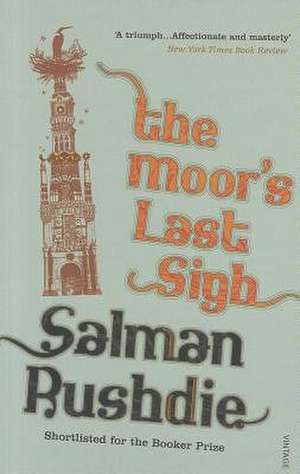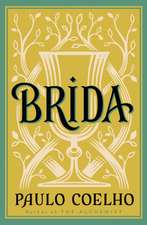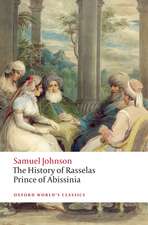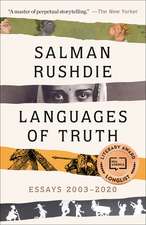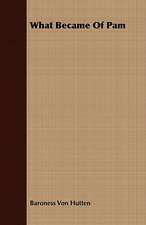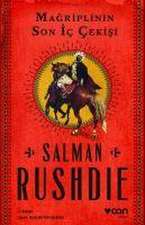The Moor's Last Sigh
Autor Salman Rushdieen Limba Engleză Paperback – 4 iul 1996
| Toate formatele și edițiile | Preț | Express |
|---|---|---|
| Paperback (2) | 55.22 lei 26-32 zile | +22.53 lei 7-13 zile |
| Vintage Publishing – 4 iul 1996 | 55.22 lei 26-32 zile | +22.53 lei 7-13 zile |
| Vintage Publishing – 31 dec 1996 | 101.88 lei 3-5 săpt. |
Preț: 55.22 lei
Preț vechi: 64.62 lei
-15% Nou
Puncte Express: 83
Preț estimativ în valută:
10.57€ • 11.03$ • 8.74£
10.57€ • 11.03$ • 8.74£
Carte disponibilă
Livrare economică 20-26 martie
Livrare express 01-07 martie pentru 32.52 lei
Preluare comenzi: 021 569.72.76
Specificații
ISBN-13: 9780099592419
ISBN-10: 009959241X
Pagini: 448
Ilustrații: geneal. table
Dimensiuni: 130 x 200 x 30 mm
Greutate: 0.32 kg
Editura: Vintage Publishing
Locul publicării:United Kingdom
ISBN-10: 009959241X
Pagini: 448
Ilustrații: geneal. table
Dimensiuni: 130 x 200 x 30 mm
Greutate: 0.32 kg
Editura: Vintage Publishing
Locul publicării:United Kingdom
Notă biografică
Salman Rushdie is the author of nine books, including Shame, Midnight's Children, East, West, and The Satanic Verses. In 1993 Midnight's Children was adjudged The Booker of Bookers.
From the Hardcover edition.
From the Hardcover edition.
Extras
ONE
I have lost count of the days that have passed since I fled the horrors of Vasco Miranda's mad fortress in the Andalusian mountain-village of Benengeli; ran from death under cover of darkness and left a message nailed to the door. And since then along my hungry, heat-hazed way there have been further bunches of scribbled sheets, swings of the hammer, sharp exclamations of two-inch nails. Long ago when I was green my beloved said to me in fondness, 'Oh, you Moor, you strange black man, always so full of theses, never a church door to nail them to.' (She, a self-professedly godly un-Christian Indian, joked about Luther's protest at Wittenberg to tease her determinedly ungodly Indian Christian lover: how stories travel, what mouths they end up in!) Unfortunately, my mother overheard; and darted, quick as snakebite: 'So full, you mean, of faeces.' Yes, mother, you had the last word on that subject, too: as about everything.
'Amrika' and 'Moskva', somebody once called them, Aurora my mother and Uma my love, nicknaming them for the two great super-powers; and people said they looked alike but I never saw it, couldn't see it at all. Both of them dead, of unnatural causes, and I in a far-off country with death at my heels and their story in my hand, a story I've been crucifying upon a gate, a fence, an olive-tree, spreading it across this landscape of my last journey, the story which points to me. On the run, I have turned the world into my pirate map, complete with clues, leading X-marks-the-spottily to the treasure of myself. When my pursuers have followed the trail they'll find me waiting, uncomplaining, out of breath, ready. Here I stand. Couldn't've done it differently.
(Here I sit, is more like it. In this dark wood-that is, upon this mount of olives, within this clump of trees, observed by the quizzically tilting stone crosses of a small, overgrown graveyard, and a little down the track from the ?ltimo Suspiro gas station-without benefit or need of Virgils, in what ought to be the middle pathway of my life, but has become, for complicated reasons, the end of the road, I bloody well collapse with exhaustion.)
And yes, ladies, much is being nailed down. Colours, for example, to the mast. But after a not-so-long (though gaudily colourful) life I am fresh out of theses. Life itself being crucifixion enough.
When you're running out of steam, when the puff that blows you onward is almost gone, it's time to make confession. Call it testament or (what you) will; life's Last Gasp Saloon. Hence this here-I-stand-or-sit with my life's sentences nailed to the landscape and the keys to a red fort in my pocket, these moments of waiting before a final surrender.
Now, therefore, it is meet to sing of endings; of what was, and may be no longer; of what was right in it, and wrong. A last sigh for a lost world, a tear for its passing. Also, however, a last hurrah, a final, scandalous skein of shaggy-dog yarns (words must suffice, video facility being unavailable) and a set of rowdy tunes for the wake. A Moor's tale, complete with sound and fury. You want? Well, even if you don't. And to begin with, pass the pepper.
-What's that you say?-
The trees themselves are surprised into speech. (And have you never, in solitude and despair, talked to the walls, to your idiot pooch, to empty air?)
I repeat: the pepper, if you please; for if it had not been for peppercorns, then what is ending now in East and West might never have begun. Pepper it was that brought Vasco da Gama's tall ships across the ocean, from Lisbon's Tower of Bel?m to the Malabar Coast: first to Calicut and later, for its lagoony harbour, to Cochin. English and French sailed in the wake of that first-arrived Portugee, so that in the period called Discovery-of-India-but how could we be discovered when we were not covered before?-we were 'not so much sub-continent as sub-condiment', as my distinguished mother had it. 'From the beginning, what the world wanted from bloody mother India was daylight-clear,' she'd say. 'They came for the hot stuff, just like any man calling on a tart.'
Mine is the story of the fall from grace of a high-born cross-breed: me, Moraes Zogoiby, called 'Moor', for most of my life the only male heir to the spice-trade-'n'-big-business crores of the da Gama-Zogoiby dynasty of Cochin, and of my banishment from what I had every right to think of as my natural life by my mother Aurora, n?e da Gama, most illustrious of our modern artists, a great beauty who was also the most sharp-tongued woman of her generation, handing out the hot stuff to anybody who came within range. Her children were shown no mercy. 'Us rosary-crucifixion beatnik chicks, we have red chillies in our veins,' she would say. 'No special privileges for flesh-and-blood relations! Darlings, we munch on flesh, and blood is our tipple of choice.'
'To be the offspring of our daemonic Aurora,' I was told when young by the Goan painter V. (for Vasco )Miranda, 'is to be, truly, a modern Lucifer. You know: son of the blooming morning.' By then my family had moved to Bombay, and this was the kind of thing that passed, in the Paradise of Aurora Zogoiby's legendary salon, for a compliment; but I remember it as a prophecy, because the day came when I was indeed hurled from that fabulous garden, and plunged towards Pandaemonium. (Banished from the natural, what choice did I have but to embrace its opposite? Which is to say, unnaturalism, the only real ism of these back-to-front and jabber-wocky days. Placed beyond the Pale, would you not seek to make light of the Dark? Just so. Moraes Zogoiby, expelled from his story, tumbled towards history.)
-And all this from a pepperpot!-
Not only pepper, but also cardamoms, cashews, cinnamon, ginger, pistachios, cloves; and as well as spice'n'nuts there were coffee beans, and the mighty tea leaf itself. But the fact remains that, in Aurora's words, 'it was pepper first and onemost-yes, yes, onemost, because why say foremost? Why come forth if you can come first?' What was true of history in general was true of our family's fortunes in particular-pepper, the coveted Black Gold of Malabar, was the original stock-in-trade of my filthy-rich folks, the wealthiest spice, nut, bean and leaf merchants in Cochin, who without any evidence save centuries of tradition claimed wrong-side-of-the-blanket descent from great Vasco da Gama himself . . .
No secrets any more. I've already nailed them up.
TWO
At the age of thirteen my mother Aurora da Gama took to wandering barefoot around her grandparents' large, odorous house on Cabral Island during the bouts of sleeplessness which became, for a time, her nightly affliction, and on these nocturnal odysseys she would invariably throw open all the windows-first the inner screen-windows whose fine-meshed netting protected the house from midges mosquitoes flies, next the leaded-glass casements themselves, and finally the slatted wooden shutters beyond. Consequently, the sixty-year-old matriarch Epifania-whose personal mosquito-net had over the years developed a number of small but significant holes which she was too myopic or stingy to notice-would be awakened each morning by itching bites on her bony blue forearms and would then unleash a thin shriek at the sight of flies buzzing around the tray of bed-tea and sweet biscuits placed beside her by Tereza, the maid (who swiftly fled). Epifania fell into a useless frenzy of scratching and swatting, lunging around her curvaceous teak boat-bed, often spilling tea on the lacy cotton bedclothes, or on her white muslin nightgown with the high ruffled collar that concealed her once swan-like, but now corrugated, neck. And as the fly-swatter in her right hand thwacked and thumped, as the long nails on her left hand raked her back in search of ever more elusive mosquito-bites, so Epifania da Gama's nightcap would slip from her head, revealing a mess of snaky white hair through which mottled patches of scalp could (alas!) all too easily be glimpsed. When young Aurora, listening at the door, judged that the sounds of her hated grandmother's fury (oaths, breaking china, the impotent slaps of the swatter, the scornful buzzing of insects) were nearing peak volume, she would put on her sweetest smile and breeze into the matriarch's presence with a gay morning greeting, knowing that the mother of all the da Gamas of Cochin would be pushed right over the edge of her wild anger by the arrival of this youthful witness to her antique helplessness. Epifania, hair a-straggle, kneeling on stained sheets, upraised swatter flapping like a broken wand, and seeking a release for her rage, howled like a weird sister, rakshasa or banshee at intruding Aurora, to the youngster's secret delight.
'Oho-ho, girl, what a shock you gave, one day you will killofy my heart.'
So it was that Aurora da Gama got the idea of murdering her grandmother from the lips of the intended victim herself. After that she began making plans, but these increasingly macabre fantasies of poisons and cliff-edges were invariably scuppered by pragmatic problems, such as the difficulty of getting hold of a cobra and inserting it between Epifania's bedsheets, or the flat refusal of the old harridan to walk on any terrain that, as she put it, 'tiltoed up or down'. And although Aurora knew very well where to lay her hands on a good sharp kitchen knife, and was certain that her strength was already great enough to choke the life out of Epifania, she nevertheless ruled out these options, too, because she had no intention of being found out, and too obvious an assault might lead to the asking of uncomfortable questions. The perfect crime having failed to make its nature known, Aurora continued to play the perfect granddaughter; but brooded on, privately, though it never occurred to her to notice that in her broodings there was more than a little of Epifania's ruthlessness:
'Patience is a virtue,' she told herself. 'I'll just bide-o my time.'
In the meanwhile she went on opening windows during those humid nights, and sometimes threw out small valuable ornaments, carved wooden trunk-nosed figures which bobbed away on the tides of the lagoon lapping at the walls of the island mansion, or delicately worked ivory tusks which naturally sank without trace. For several days the family was at a loss to understand these developments. The sons of Epifania da Gama, Aurora's uncle Aires-pronounced-Irish and her father Camoens-pronounced-Camonsh-through-the-nose, would awake to find that mischievous night-breezes had blown bush-shirts from their closets and business papers from their pending trays. Nimble-fingered draughts had untied the necks of the sample-bags, jute sacks full of big and little cardamoms and karri-leaves and cashews that always stood like sentinels along the shady corridors of the office wing, and as a result there were fenugreek seeds and pistachios tumbling crazily across the worn old floor made of limestone, charcoal, eggwhites and other, forgotten ingredients, and the scent of spices in the air tormented the matriarch, who had grown more and more allergic with the passing years to the sources of her family's fortune.
And if the flies buzzed in through the opened netting-windows, and the naughty gusts through the parted panes of leaded glass, then the opening of the shutters let in everything else: the dust and the tumult of boats in Cochin harbour, the horns of freighters and tugboat chugs, the fishermen's dirty jokes and the throb of their jellyfish stings, the sunlight as sharp as a knife, the heat that could choke you like a damp cloth pulled tightly around your head, the calls of floating hawkers, the wafting sadness of the unmarried Jews across the water in Mattancherri, the menace of emerald smugglers, the machinations of business rivals, the growing nervousness of the British colony in Fort Cochin, the cash demands of the staff and of the plantation workers in the Spice Mountains, the tales of Communist troublemaking and Congresswallah politics, the names Gandhi and Nehru, the rumours of famine in the east and hunger strikes in the north, the songs and drum-beats of the oral storytellers, and the heavy rolling sound (as they broke against Cabral Island's rickety jetty) of the incoming tides of history. 'This low-class country, Jesus Christ,' Aires-uncle swore at breakfast in his best gaitered and hatterred manner. 'Outside world isn't dirtyfilthy enough, eh, eh? Then what frightful bumbolina, what dash-it-all bugger-boy let it in here again? Is this a decent residence, by Jove, or a shithouse excuse-my-French in the bazaar?'
That morning Aurora understood that she had gone too far, because her beloved father Camoens, a little goateed stick of a man in a loud bush-shirt who was already a head shorter than his beanpole daughter, took her down to the little jetty, and positively capering in his emotion and excitement so that against the improbable beauty and mercantile bustle of the lagoon his silhouette seemed like a figure out of a fantasy, a leprechaun dancing in a glade, perhaps, or a benign djinni escaped from a lamp, he confided in a secret hiss his great and heartbreaking news. Named after a poet and possessed of a dreamy nature (but not the gift), Camoens timidly suggested the possibility of a haunting.
'It is my belief', he told his dumbstruck daughter, 'that your darling Mummy has come back to us. You know how she loved fresh breeze, how she fought with your grandmother for air; and now by magic the windows fly open. And, daughter mine, just look what-what items are missing! Only those she always hated, don't you see? Aires's elephant gods, she used to say. It is your uncle's little hobby-collection of Ganeshas that has gone. That, and ivory.'
Epifania's elephant-teeth. Too many elephants sitting on this house. The late Belle da Gama had always spoken her mind. 'I think so if I stay up tonight maybe I can look once more upon her dear face,' Camoens yearningly confided. 'What do you think? Message is clear as day. Why not wait with me? You and your father are in a same state: he misses his Mrs, and you are glum about your Mum.'
I have lost count of the days that have passed since I fled the horrors of Vasco Miranda's mad fortress in the Andalusian mountain-village of Benengeli; ran from death under cover of darkness and left a message nailed to the door. And since then along my hungry, heat-hazed way there have been further bunches of scribbled sheets, swings of the hammer, sharp exclamations of two-inch nails. Long ago when I was green my beloved said to me in fondness, 'Oh, you Moor, you strange black man, always so full of theses, never a church door to nail them to.' (She, a self-professedly godly un-Christian Indian, joked about Luther's protest at Wittenberg to tease her determinedly ungodly Indian Christian lover: how stories travel, what mouths they end up in!) Unfortunately, my mother overheard; and darted, quick as snakebite: 'So full, you mean, of faeces.' Yes, mother, you had the last word on that subject, too: as about everything.
'Amrika' and 'Moskva', somebody once called them, Aurora my mother and Uma my love, nicknaming them for the two great super-powers; and people said they looked alike but I never saw it, couldn't see it at all. Both of them dead, of unnatural causes, and I in a far-off country with death at my heels and their story in my hand, a story I've been crucifying upon a gate, a fence, an olive-tree, spreading it across this landscape of my last journey, the story which points to me. On the run, I have turned the world into my pirate map, complete with clues, leading X-marks-the-spottily to the treasure of myself. When my pursuers have followed the trail they'll find me waiting, uncomplaining, out of breath, ready. Here I stand. Couldn't've done it differently.
(Here I sit, is more like it. In this dark wood-that is, upon this mount of olives, within this clump of trees, observed by the quizzically tilting stone crosses of a small, overgrown graveyard, and a little down the track from the ?ltimo Suspiro gas station-without benefit or need of Virgils, in what ought to be the middle pathway of my life, but has become, for complicated reasons, the end of the road, I bloody well collapse with exhaustion.)
And yes, ladies, much is being nailed down. Colours, for example, to the mast. But after a not-so-long (though gaudily colourful) life I am fresh out of theses. Life itself being crucifixion enough.
When you're running out of steam, when the puff that blows you onward is almost gone, it's time to make confession. Call it testament or (what you) will; life's Last Gasp Saloon. Hence this here-I-stand-or-sit with my life's sentences nailed to the landscape and the keys to a red fort in my pocket, these moments of waiting before a final surrender.
Now, therefore, it is meet to sing of endings; of what was, and may be no longer; of what was right in it, and wrong. A last sigh for a lost world, a tear for its passing. Also, however, a last hurrah, a final, scandalous skein of shaggy-dog yarns (words must suffice, video facility being unavailable) and a set of rowdy tunes for the wake. A Moor's tale, complete with sound and fury. You want? Well, even if you don't. And to begin with, pass the pepper.
-What's that you say?-
The trees themselves are surprised into speech. (And have you never, in solitude and despair, talked to the walls, to your idiot pooch, to empty air?)
I repeat: the pepper, if you please; for if it had not been for peppercorns, then what is ending now in East and West might never have begun. Pepper it was that brought Vasco da Gama's tall ships across the ocean, from Lisbon's Tower of Bel?m to the Malabar Coast: first to Calicut and later, for its lagoony harbour, to Cochin. English and French sailed in the wake of that first-arrived Portugee, so that in the period called Discovery-of-India-but how could we be discovered when we were not covered before?-we were 'not so much sub-continent as sub-condiment', as my distinguished mother had it. 'From the beginning, what the world wanted from bloody mother India was daylight-clear,' she'd say. 'They came for the hot stuff, just like any man calling on a tart.'
Mine is the story of the fall from grace of a high-born cross-breed: me, Moraes Zogoiby, called 'Moor', for most of my life the only male heir to the spice-trade-'n'-big-business crores of the da Gama-Zogoiby dynasty of Cochin, and of my banishment from what I had every right to think of as my natural life by my mother Aurora, n?e da Gama, most illustrious of our modern artists, a great beauty who was also the most sharp-tongued woman of her generation, handing out the hot stuff to anybody who came within range. Her children were shown no mercy. 'Us rosary-crucifixion beatnik chicks, we have red chillies in our veins,' she would say. 'No special privileges for flesh-and-blood relations! Darlings, we munch on flesh, and blood is our tipple of choice.'
'To be the offspring of our daemonic Aurora,' I was told when young by the Goan painter V. (for Vasco )Miranda, 'is to be, truly, a modern Lucifer. You know: son of the blooming morning.' By then my family had moved to Bombay, and this was the kind of thing that passed, in the Paradise of Aurora Zogoiby's legendary salon, for a compliment; but I remember it as a prophecy, because the day came when I was indeed hurled from that fabulous garden, and plunged towards Pandaemonium. (Banished from the natural, what choice did I have but to embrace its opposite? Which is to say, unnaturalism, the only real ism of these back-to-front and jabber-wocky days. Placed beyond the Pale, would you not seek to make light of the Dark? Just so. Moraes Zogoiby, expelled from his story, tumbled towards history.)
-And all this from a pepperpot!-
Not only pepper, but also cardamoms, cashews, cinnamon, ginger, pistachios, cloves; and as well as spice'n'nuts there were coffee beans, and the mighty tea leaf itself. But the fact remains that, in Aurora's words, 'it was pepper first and onemost-yes, yes, onemost, because why say foremost? Why come forth if you can come first?' What was true of history in general was true of our family's fortunes in particular-pepper, the coveted Black Gold of Malabar, was the original stock-in-trade of my filthy-rich folks, the wealthiest spice, nut, bean and leaf merchants in Cochin, who without any evidence save centuries of tradition claimed wrong-side-of-the-blanket descent from great Vasco da Gama himself . . .
No secrets any more. I've already nailed them up.
TWO
At the age of thirteen my mother Aurora da Gama took to wandering barefoot around her grandparents' large, odorous house on Cabral Island during the bouts of sleeplessness which became, for a time, her nightly affliction, and on these nocturnal odysseys she would invariably throw open all the windows-first the inner screen-windows whose fine-meshed netting protected the house from midges mosquitoes flies, next the leaded-glass casements themselves, and finally the slatted wooden shutters beyond. Consequently, the sixty-year-old matriarch Epifania-whose personal mosquito-net had over the years developed a number of small but significant holes which she was too myopic or stingy to notice-would be awakened each morning by itching bites on her bony blue forearms and would then unleash a thin shriek at the sight of flies buzzing around the tray of bed-tea and sweet biscuits placed beside her by Tereza, the maid (who swiftly fled). Epifania fell into a useless frenzy of scratching and swatting, lunging around her curvaceous teak boat-bed, often spilling tea on the lacy cotton bedclothes, or on her white muslin nightgown with the high ruffled collar that concealed her once swan-like, but now corrugated, neck. And as the fly-swatter in her right hand thwacked and thumped, as the long nails on her left hand raked her back in search of ever more elusive mosquito-bites, so Epifania da Gama's nightcap would slip from her head, revealing a mess of snaky white hair through which mottled patches of scalp could (alas!) all too easily be glimpsed. When young Aurora, listening at the door, judged that the sounds of her hated grandmother's fury (oaths, breaking china, the impotent slaps of the swatter, the scornful buzzing of insects) were nearing peak volume, she would put on her sweetest smile and breeze into the matriarch's presence with a gay morning greeting, knowing that the mother of all the da Gamas of Cochin would be pushed right over the edge of her wild anger by the arrival of this youthful witness to her antique helplessness. Epifania, hair a-straggle, kneeling on stained sheets, upraised swatter flapping like a broken wand, and seeking a release for her rage, howled like a weird sister, rakshasa or banshee at intruding Aurora, to the youngster's secret delight.
'Oho-ho, girl, what a shock you gave, one day you will killofy my heart.'
So it was that Aurora da Gama got the idea of murdering her grandmother from the lips of the intended victim herself. After that she began making plans, but these increasingly macabre fantasies of poisons and cliff-edges were invariably scuppered by pragmatic problems, such as the difficulty of getting hold of a cobra and inserting it between Epifania's bedsheets, or the flat refusal of the old harridan to walk on any terrain that, as she put it, 'tiltoed up or down'. And although Aurora knew very well where to lay her hands on a good sharp kitchen knife, and was certain that her strength was already great enough to choke the life out of Epifania, she nevertheless ruled out these options, too, because she had no intention of being found out, and too obvious an assault might lead to the asking of uncomfortable questions. The perfect crime having failed to make its nature known, Aurora continued to play the perfect granddaughter; but brooded on, privately, though it never occurred to her to notice that in her broodings there was more than a little of Epifania's ruthlessness:
'Patience is a virtue,' she told herself. 'I'll just bide-o my time.'
In the meanwhile she went on opening windows during those humid nights, and sometimes threw out small valuable ornaments, carved wooden trunk-nosed figures which bobbed away on the tides of the lagoon lapping at the walls of the island mansion, or delicately worked ivory tusks which naturally sank without trace. For several days the family was at a loss to understand these developments. The sons of Epifania da Gama, Aurora's uncle Aires-pronounced-Irish and her father Camoens-pronounced-Camonsh-through-the-nose, would awake to find that mischievous night-breezes had blown bush-shirts from their closets and business papers from their pending trays. Nimble-fingered draughts had untied the necks of the sample-bags, jute sacks full of big and little cardamoms and karri-leaves and cashews that always stood like sentinels along the shady corridors of the office wing, and as a result there were fenugreek seeds and pistachios tumbling crazily across the worn old floor made of limestone, charcoal, eggwhites and other, forgotten ingredients, and the scent of spices in the air tormented the matriarch, who had grown more and more allergic with the passing years to the sources of her family's fortune.
And if the flies buzzed in through the opened netting-windows, and the naughty gusts through the parted panes of leaded glass, then the opening of the shutters let in everything else: the dust and the tumult of boats in Cochin harbour, the horns of freighters and tugboat chugs, the fishermen's dirty jokes and the throb of their jellyfish stings, the sunlight as sharp as a knife, the heat that could choke you like a damp cloth pulled tightly around your head, the calls of floating hawkers, the wafting sadness of the unmarried Jews across the water in Mattancherri, the menace of emerald smugglers, the machinations of business rivals, the growing nervousness of the British colony in Fort Cochin, the cash demands of the staff and of the plantation workers in the Spice Mountains, the tales of Communist troublemaking and Congresswallah politics, the names Gandhi and Nehru, the rumours of famine in the east and hunger strikes in the north, the songs and drum-beats of the oral storytellers, and the heavy rolling sound (as they broke against Cabral Island's rickety jetty) of the incoming tides of history. 'This low-class country, Jesus Christ,' Aires-uncle swore at breakfast in his best gaitered and hatterred manner. 'Outside world isn't dirtyfilthy enough, eh, eh? Then what frightful bumbolina, what dash-it-all bugger-boy let it in here again? Is this a decent residence, by Jove, or a shithouse excuse-my-French in the bazaar?'
That morning Aurora understood that she had gone too far, because her beloved father Camoens, a little goateed stick of a man in a loud bush-shirt who was already a head shorter than his beanpole daughter, took her down to the little jetty, and positively capering in his emotion and excitement so that against the improbable beauty and mercantile bustle of the lagoon his silhouette seemed like a figure out of a fantasy, a leprechaun dancing in a glade, perhaps, or a benign djinni escaped from a lamp, he confided in a secret hiss his great and heartbreaking news. Named after a poet and possessed of a dreamy nature (but not the gift), Camoens timidly suggested the possibility of a haunting.
'It is my belief', he told his dumbstruck daughter, 'that your darling Mummy has come back to us. You know how she loved fresh breeze, how she fought with your grandmother for air; and now by magic the windows fly open. And, daughter mine, just look what-what items are missing! Only those she always hated, don't you see? Aires's elephant gods, she used to say. It is your uncle's little hobby-collection of Ganeshas that has gone. That, and ivory.'
Epifania's elephant-teeth. Too many elephants sitting on this house. The late Belle da Gama had always spoken her mind. 'I think so if I stay up tonight maybe I can look once more upon her dear face,' Camoens yearningly confided. 'What do you think? Message is clear as day. Why not wait with me? You and your father are in a same state: he misses his Mrs, and you are glum about your Mum.'
Recenzii
"The most complete and gratifying work to emerge from Salman Rushdie's imagination...The Moor's Last Sign is an exotic story, in its setting, in its characters, in its punning extravagance, and in its deeply human core. It is an extraordinary family saga...full of wonderful characters, and the insight born of genuine reflection...A remarkable spell of creativity." --Edmonton Journal
"A rich, wonderfully readable novel." --Toronto Star
"One of the most wonderful works of political art I have encountered, a novel to rival Turgenev's Fathers and Sons, or Dante's Divine Comedy...The Moor's Last Sigh is one of the most admirable novels I've ever read." --Ottawa Citizen
"A rich, wonderfully readable novel." --Toronto Star
"One of the most wonderful works of political art I have encountered, a novel to rival Turgenev's Fathers and Sons, or Dante's Divine Comedy...The Moor's Last Sigh is one of the most admirable novels I've ever read." --Ottawa Citizen
